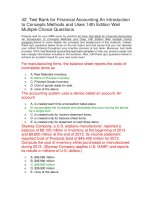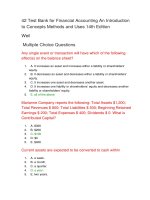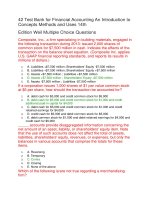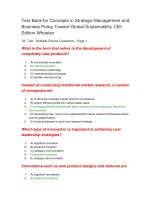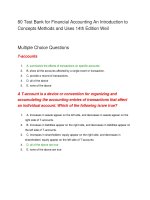Test bank for 70 228 MCSE guide to MS SQL server 2000 administration 1st edition by mathew
Bạn đang xem bản rút gọn của tài liệu. Xem và tải ngay bản đầy đủ của tài liệu tại đây (282.65 KB, 16 trang )
Test Bank for 70 228 MCSE Guide to MS SQL Server 2000
Administration 1st Edition by Mathew Raftree
Link full download test bank:
/>Link full download Solutions Manual:
/>
CHAPTER 2 - INSTALLING AND UPGRADING SQL SERVER 2000
TRUE/FALSE
1.
The regional options item in the Windows Control panel shows the Windows locale of the computer.
ANS: T
2.
PTS: 1
REF: 41
When examining code pages, each European language, such as German or Spanish, has its own single
byte code page.
ANS: T
4.
REF: 40
Unicode data types require half as much physical space as typical databases because they implement two
byte characters.
ANS: F
3.
PTS: 1
PTS: 1
REF: 41
The network libraries screen shown above allows network libraries to be installed for an installation of
SQL Server 2000.
ANS: T
PTS: 1
REF: 42
5.
Named pipes are NOT required when installing SQL Server 2000 in Windows 2000 or Windows NT.
ANS: F
6.
REF: 43
PTS: 1
REF: 44
Each SQL Server computer in a cluster is called a node.
ANS: T
9.
PTS: 1
The SQL Server 2000 installation ends by installing the connectivity components.
ANS: F
8.
REF: 42
Windows 2000 has two licensing schemes, one is based on the number of devices connecting to a
database instance and the other is based on the number of processors that the SQL Server has.
ANS: T
7.
PTS: 1
PTS: 1
REF: 45
The Registry rebuild option will repair any data errors for the master database.
ANS: F
PTS: 1
REF: 46
10. The only way to get back to the original SQL Server 7.0 installation is to uninstall SQL Server 2000 and
then reinstall it.
ANS: T
PTS: 1
REF: 47
11. The Install Analysis Services option will begin the installation process for data warehousing components
of SQL Server 2000.
ANS: T
PTS: 1
REF: 28
12. The Virtual Server option is also available if MCSC is NOT detected.
ANS: F
PTS: 1
REF: 29
MODIFIED TRUE/FALSE
1.
In a typical production environment, a machine with at least two Pentium processors and 256 MB of
RAM is a good rule of thumb. _________________________
ANS: T
2.
PTS: 1
REF: 24
All SQL Server 2000 Editions require Internet Explorer 4. _________________________
ANS: F, Internet Explorer 5
PTS: 1
REF: 25
3.
If the XML features are going to be used, Internet Information Services must be installed prior to a SQL
Server 2000 installation. _________________________
ANS: T
4.
PTS: 1
REF: 25
Internet Information Services CANNOT be shut down by going to the Services Manager.
_________________________
ANS: F, can
PTS: 1
5.
REF: 26
The Virtual Server option will NOT be selected by default if the installation program detects that
Microsoft Clustering Services is running on the computer. _________________________
ANS: F, will
PTS: 1
6.
REF: 29
In the figure shown above, the company name is NOT required for proper installation.
_________________________
ANS: F, is
PTS: 1
7.
REF: 31
An Application Service Provider is a company that hosts and supports software for its customers.
_________________________
ANS: T
PTS: 1
REF: 32
8.
The figure shown above illustrates that the default instance is chosen. This selection is made manually
when a preexisting instance of SQL Server 2000 is NOT detected on the target machine.
_________________________
ANS: F, automatically
PTS: 1
9.
REF: 33
The typical installation of SQL Server 2000 allows an individual to install all of the components of SQL
Server and assumes the default installation option. _________________________
ANS: T
PTS: 1
REF: 34
10. Windows Authentication Mode is NOT recommended with SQL Server 2000.
_________________________
ANS: F, is
PTS: 1
REF: 39
MULTIPLE CHOICE
1.
In a typical production environment, which of the following would be the most optimum situation to
have in terms of processor and memory?
a. One Pentium processor and 128 MB of RAM
b. Two Pentium processors and 256 MB of RAM
c. One Pentium processor and 256 MB of RAM
d. Two Pentium processors and 64 MB of RAM
ANS: B
2.
PTS: 1
REF: 25
When installing the SQL Server components, which of the following options will begin the installation
process for the administrative tools and the database engine?
a. Install English Query
b. Install Analysis Services
ANS: C
3.
PTS: 1
REF: 28
PTS: 1
REF: 30
When multiple instances of SQL Server 2000 are installed on a single computer, which of the following
resources are created for each instance?
a. System and user databases
b. SQL Server and SQL Server Agent Services
c. Registry keys associated with the MSSQL and SQL Server Agent services
d. All of the above
ANS: D
7.
REF: 28
When installing SQL Server, which of the following options is only enabled if an existing instance of
SQL Server is detected by the setup program?
a. Advanced options
c. Typical
b. Upgrade/Remove or Add
d. Custom
ANS: B
6.
PTS: 1
When installing the SQL Server components, which of the following options installs a special set of
facilities that allows users of SQL Server 2000 to query the database using logical English statements?
a. Install English Query
c. Both A and B
b. Install Analysis Services
d. None of the above
ANS: A
5.
REF: 28
When installing the SQL Server components, which of the following options will begin the installation
process for the data warehousing components of SQL Server 2000?
a. Install English Query
c. Install Database Server
b. Install Analysis Services
d. None of the above
ANS: B
4.
PTS: 1
c. Install Database server
d. None of the above
PTS: 1
REF: 32
When installing SQL Server 2000, which of the following options will install all of the components of
SQL Server and assume the default installation options?
a. Typical
c. Custom
b. Minimum d. All of the above
ANS: A
8.
REF: 34
When installing SQL Server 2000, which of the following is only chosen when the hardware limitations
prevent the installation of all of the components?
a. Typical
c. Custom
b. Minimum d. None of the above
ANS: B
9.
PTS: 1
PTS: 1
REF: 34
When installing SQL Server 2000, which of the following components allows an administrator to
explicitly select components and sub-components as well as customize the collation settings for
installation?
a. Typical
c. Custom
b. Minimum d. None of the above
ANS: C
PTS: 1
REF: 34
10. When installing the program files for SQL Server 2000, which of the following is considered to be true?
a. They are located on the hard drive and the data files are stored on the secondary physical drive.
b. Program files are stored on the secondary physical drive and the data files are stored on the
primary hard drive.
c. Both A and B
d. None of the above
ANS: A
PTS: 1
REF: 34
11. Which of the following would be considered server components of SQL Server 2000?
a. Upgrade tools
c. Full-Text Search
b. Replication support d. All of the above
ANS: D
PTS: 1
REF: 35
12. Which of the following components installs a set of programming examples that demonstrate common
programming tasks associated with developing applications with SQL Server 2000?
a. Books Online
c. Code samples
b. Development tools d. Client samples
ANS: C
PTS: 1
REF: 36
13. Which of the following components installs tools that are useful when programming applications for
SQL Server 2000?
a. Code tools c. Development tools
b. Client tools d. All of the above
ANS: C
PTS: 1
REF: 36
14. Which of the following features can only be implemented if the services are configured to use a domain
user account?
a. Replication
c. Backups to network hard drives
b. Remote procedure calls
d. All of the above
ANS: D
PTS: 1
REF: 37
15. When installing SQL Server 2000, which of the following would be true?
a. It requires a Pentium 166 MHz or higher.
b. It requires 64 MB of RAM at minimum.
c. More disk space will be required depending on the volume of data being stored on or in the user
database.
d. All of the above
ANS: D
PTS: 1
REF: 24
16. Which of the following is NOT supported with main instances of SQL Server 2000 and will NOT be
supported in future releases of SQL Server?
a. AppleTalk ADSP
c. Both A and B
b. Banyan VINES
d. TCP/IP
ANS: C
PTS: 1
REF: 43
17. Which of the following is a company that hosts and supports software for its customers or provides an
application that can be leased by its customers?
a. Cluster Service Provider
c. Internet Service Provider
b. Application Service Provider
d. Mixed Service Provider
ANS: B
PTS: 1
REF: 32
18. Which of the following is a library that supports a special type of client?
a. Banyan VINES
c. NWLink
b. Heartbeat
d. Windows Authentication
ANS: A
PTS: 1
REF: 43
19. Which of the following is a term used to refer to shared sets of resources used by an SQL Server failover
cluster?
a. Collision group
c. Authentication group
b. Mixed group
d. Cluster group
ANS: D
PTS: 1
REF: 45
20. Which of the following defines bit patterns and represents specific letters, numbers, and symbols?
a. Code page
c. Sort code
b. Unicode code
d. Node
ANS: A
PTS: 1
REF: 41
21. Which of the following specifies the binary patterns that represent each character available, and the rules
by which characters are sorted and compared?
a. Heartbeat c. Node
b. Collation
d. Sort code
ANS: B
PTS: 1
REF: 26
22. Which of the following are simple network messages passed between nodes on failover clusters that are
used to determine which nodes are operational?
a. Locale
c. Heartbeat
b. Name pipe d. Sort order
ANS: C
PTS: 1
REF: 45
23. Which of the following would be considered the Windows operating system attribute that defines certain
behaviors related to language?
a. Sort locale c. Node
b. Locale
d. Sort order
ANS: B
PTS: 1
REF: 40
24. Which of the following would be considered the key technologies for enabling data access across a
network?
a. Microsoft Data Access Components c. Named Data Access Components
b. Mixed Data Access Components
d. Windows Data Access Components
ANS: A
PTS: 1
REF: 44
25. Which of the following is used to validate user connections to SQL Server instances?
a. Multi-protocol
c. Mixed Authentication mode
b. Order Authentication mode d. Collation Authentication mode
ANS: C
PTS: 1
REF: 39
26. Which of the following network libraries offers support for TCP/IP, name pipe, and NWLink IPX/SPX?
a. Multi-protocol
c. Banyan VINES
b. AppleTalk
d. All of the above
ANS: A
PTS: 1
REF: 43
27. Which of the following network libraries is required when installing SQL Server 2000 in Windows 2000
or Windows NT?
a. Banyan VINES
c. AppleTalk
b. Named pipe
d. All of the above
ANS: B
PTS: 1
REF: 42
28. Which of the following is a term used to refer to a single SQL server computer within a failover cluster?
a. Node
c. Cluster
b. Pipe
d. Group
ANS: A
PTS: 1
REF: 45
29. Which of the following is a set of rules used by collation to define how characters are sorted and
evaluated by comparison operations?
a. Mixed order c. Cluster order
b. Sort order d. Group order
ANS: B
PTS: 1
REF: 41
30. Which of the following libraries provides support for Novell NetWare clients connecting to a SQL
server?
a. AppleTalk
c. NWLink IPX/SPX
b. Banyan VINES
d. All of the above
ANS: C
PTS: 1
REF: 45
31. Which of the following network libraries allows communication through standard windows sockets?
a. TCP/IP sockets
c. Banyan VINES sockets
b. AppleTalk sockets d. All of the above
ANS: A
PTS: 1
REF: 43
32. The default port for default instances for SQL Server 2000 is ____.
a. 1533
c. 1433
b. 1633
d. 1733
ANS: C
PTS: 1
REF: 43
33. ____ defines a set of letters, numbers, and symbols by using two bytes per character.
a. Binary code c. Both A and B
b. Unicode
d. None of the above
ANS: B
PTS: 1
REF: 41
34. When in ____ users are identified by their Windows user or group when they connect to a network.
a. windows authentication mode
c. collation mode
b. mixed Authentication mode
d. none of the above
ANS: A
PTS: 1
REF: 39
YES/NO
1.
Are heartbeats considered simple network messages passed between nodes on failover clusters that also
are used to determine which nodes are operational?
ANS: Y
2.
PTS: 1
REF: 43
Does the locale define the code page used to store and sort character data as well as language specific
items?
ANS: Y
4.
REF: 45
Is Banyan VINES the library that supports AppleTalk clients?
ANS: N
3.
PTS: 1
PTS: 1
REF: 40
Would the term module refer to a single SQL server computer within a failover cluster?
ANS: N
PTS: 1
REF: 45
5.
Is sort order a set of rules used by a collation to define how characters are sorted and evaluated by
comparison operations?
ANS: Y
6.
REF: 43
PTS: 1
REF: 43
Is Unicode able to offer more than 65,000 possible values compared to single byte character sets, which
only allow 256?
ANS: Y
9.
PTS: 1
Will Banyan VINES be supported in future releases of SQL Server?
ANS: N
8.
REF: 41
Will AppleTalk ADSP be supported in future releases of SQL Server?
ANS: N
7.
PTS: 1
PTS: 1
REF: 41
Is the default port for default instances of SQL Server 2000 1533?
ANS: N
PTS: 1
REF: 43
10. Can SQL Server 2000 run with a Pentium 166 MHz processor?
ANS: Y
PTS: 1
REF: 24
11. Do all of the components checked in the figure shown above need to be selected in order to have a
successful installation of SQL Server 2000?
ANS: N
PTS: 1
REF: 35
12. In the figure shown above, when considering collation considerations, are the default selections
acceptable for a proper installation of SQL Server 2000?
ANS: Y
PTS: 1
REF: 40
COMPLETION
1.
A(n) ____________________ permits access to shared network resources.
ANS: named pipe
PTS: 1
2.
REF: 42
____________________ are simple network messages passed between nodes on failover clusters used
to determine which nodes are operational.
ANS: Heartbeats
PTS: 1
3.
REF: 45
The ____________________ defines the code page used to store and sort character data as well as
language specific items.
ANS: locale
PTS: 1
4.
REF: 40
___________________________________ is installed as a suite of connectivity tools for accessing data
using a variety of formats.
ANS:
Microsoft Data Access Components
MDAC
PTS: 1
5.
REF: 44
____________________ specifies the binary patterns that represent each character available and the
rules by which characters are sorted and compared.
ANS: Collation
PTS: 1
6.
REF: 26
In _________________________ users are identified by their Windows domain login or SQL Server
login information.
ANS: Mixed Authentication Mode
PTS: 1
7.
REF: 39
____________________ is a single network library that offers support for TCP/IP, named pipes, and
NWLink IPX/SPX.
ANS: Multi-protocol
PTS: 1
8.
REF: 43
____________________ refers to a single SQL Server computer within a failover cluster.
ANS: Node
PTS: 1
9.
REF: 45
In _________________________ mode, users are identified by their Windows user or group when they
connect.
ANS: Windows Authentication
PTS: 1
REF: 39
10. A(n) ______________________________ provides an application that can be leased by its customers.
ANS:
Application Service Provider
ASP
PTS: 1
REF: 32
MATCHING
Identify the correct word with its corresponding definition.
a. Code page
f. Locale
b. Application Service Provider (ASP) g. Cluster group
c. Mixed Authentication mode
d. Collation
e. Named pipes
h. Windows Allocation mode
i. Unicode
j. Sort order
1.
Defines a set of letters, numbers, and symbols by using two bytes per character.
2.
Attribute that defines certain behaviors related to language.
3.
A company that hosts and supports software for its customers or provides an application that can be
leased by its customers.
4.
Defines the bit patterns that represent specific letters, numbers, and symbols.
5.
Used to refer to shared sets of resources used by SQL Server failover clusters.
6.
Users are identified by their Windows domain login or SQL Server login information.
7.
Are required when installing SQL Server in Windows 2000 or Windows NT.
8.
It is used to validate user connections to SQL Server instances.
9.
Specifies the binary patterns that represent each character available and the rules by which characters are
sorted and compared.
10. Set of rules used to define how characters are sorted and evaluated by comparison operations.
1.
ANS: I
PTS: 1 REF: 41
2.
ANS: F
PTS: 1 REF: 40
3.
ANS: B
PTS: 1 REF: 32
4.
ANS: A
PTS: 1 REF: 41
5.
ANS: G
PTS: 1 REF: 45
6.
ANS: C
PTS: 1 REF: 39
7.
ANS: E
PTS: 1 REF: 42
8.
ANS: H
PTS: 1 REF: 39
9.
ANS: D
PTS: 1 REF: 26
10. ANS: J
PTS: 1 REF: 41
SHORT ANSWER
1. When installing SQL Server 2000, it is possible to select the record unattended.iss file option. Describe
its purpose.
ANS:
When this option is chosen all of the typical prompts for an installation are provided but the selections
are used to build an unintended installation file instead of actually installing SQL Server 2000. The
file generated has an extension of .iss and is stored in the //WINNT folder of the computer. This file is
used by running the SQL Server setup directly from the command prompt.
PTS: 1
REF: 45
2. Describe the procedures used when upgrading from SQL Server 7.0.
ANS:
There are two ways to upgrade databases to SQL Server 2000 from version 7.0. The most obvious is
to upgrade all of the underlying components as well as existing databases by running a standard
upgrade using the SQL Server 2000 Setup program. The second option involves using the Copy
Database Wizard to move databases from version 7.0 installation to an existent version of 2000
instance.
PTS: 1
REF: 47
3. Describe how an individual would upgrade from SQL Server 6.5 to 7.0.
ANS:
The architectural differences between 6.5 and 7.0 are so great that a straightforward upgrade cannot be
performed from version 6.5 to SQL Server 2000. In this type of upgrade the SQL Server 2000
components are installed without affecting the existing version 6.5 installation. The databases and
some of the SQL Server settings are actually copied to the 2000 version installation. To perform this
type of upgrade, you must first install SQL Server 2000 on the same machine as the version 6.5
installation and then you must execute a series of steps to migrate both of the database structures and
all of the data.
PTS: 1
REF: 47
4. SQL Server Setup will create three files that can provide information about problems that occur during an
installation or upgrade. Name the files and describe them.
ANS:
Sqlstp.log: This file is located in the \\WINNT folder on the system drive of the target machine. It
records any errors that occur during the configuration portion of setup.
Setup.log: This file is located in the \\WINNT folder on the setup drive of the target machine.
Error.log: The most recent error log for SQL 2000 can be found in the \log folder off of the
installation directory.
PTS: 1
REF: 49
5. Describe the hardware requirements for SQL Server 2000 Windows CE Edition.
ANS:
This operating system requires Microsoft Windows CE operating system version 2.11 or later for
Handheld PC Pro (H/PC Pro) or Palm-size PC (P/PC) devices. Secondly Windows CE 3.0 or later for
Pocket PC devices. Thirdly, 1-3 MB of available storage space, depending on processor type,
operating system version, and components installed.
PTS: 1
REF: 25
